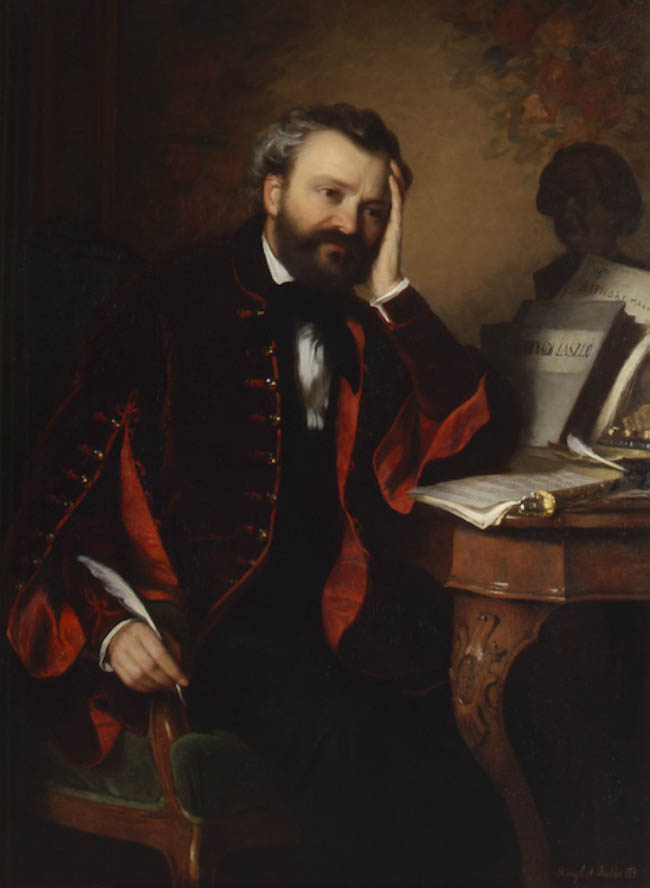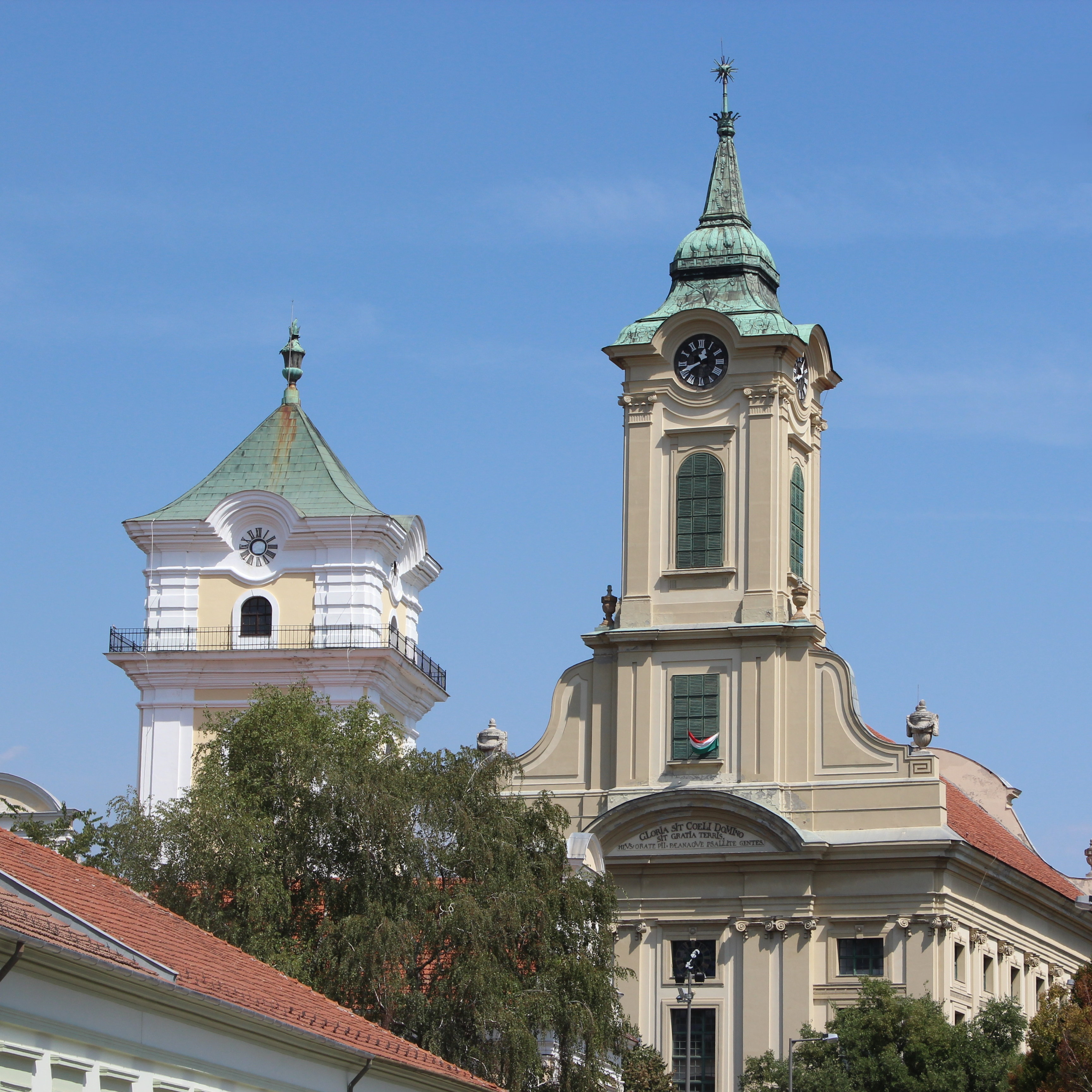|
Ferenc Erkel
Ferenc Erkel ( hu, Erkel Ferenc , german: link=no, Franz Erkel; November 7, 1810June 15, 1893) was a Hungarian composer, conductor and pianist. He was the father of Hungarian grand opera, written mainly on historical themes, which are still often performed in Hungary. He also composed the music of "Himnusz", the national anthem of Hungary, which was adopted in 1844. He died in Budapest. Biography Erkel was born in Gyula to a Danube Swabian family, a son of Joseph Erkel who was a musician. His mother was the Hungarian Klára Ruttkay. The libretti of his first three operas were written by Béni Egressy. Beside his operas, for which he is best known, he wrote pieces for piano and chorus, and a majestic ''Festival Overture''. He acquainted Hector Berlioz with the tune of the Rákóczi March, which Berlioz used in '' The Damnation of Faust''. He headed the Budapest Philharmonic Orchestra (founded in 1853). He was also the director and piano teacher of the Hungarian Academy ... [...More Info...] [...Related Items...] OR: [Wikipedia] [Google] [Baidu] |
Erkel Ferenc Györgyi Alajos
Erkel may refer to the following. * Arjan Erkel (born 1970), Dutch medical aid worker * Ferenc Erkel (1810–1893), Hungarian composer, who wrote the Hungarian national opera ''Bánk bán'' *Sándor Erkel Sándor Erkel (2 January 1846 – 14 October 1900) (Hungarian: Erkel Sándor) was a Hungarian composer, conductor and director of the Hungarian State Opera. Biography Born in Buda, Erkel was the youngest son of the famous Hungarian composer, F ... (1846–1900), musician, Ferenc's son * ''Erkel'', a 1952 Hungarian film See also Urkel {{Surname ... [...More Info...] [...Related Items...] OR: [Wikipedia] [Google] [Baidu] |
Franz Liszt Academy Of Music
The Liszt Ferenc Academy of Music ( hu, Liszt Ferenc Zeneművészeti Egyetem, often abbreviated as ''Zeneakadémia'', "Liszt Academy") is a music university and a concert hall in Budapest, Hungary, founded on November 14, 1875. It is home to the Liszt Collection, which features several valuable books and manuscripts donated by Franz Liszt upon his death, and the ''AVISO studio'', a collaboration between the governments of Hungary and Japan to provide sound recording equipment and training for students. The Liszt Ferenc Academy of Music was founded by Franz Liszt himself (though named after its founder only in 1925, approx. 50 years after it was relocated to its current location at the heart of Budapest). Facilities The Academy was originally called the "Royal National Hungarian Academy of Music" and it was also called "College of Music" from 1919 to 1925. It was then named after its founder Franz Liszt in 1925. It was founded in Liszt's home, and relocated to a three-story Neo-Re ... [...More Info...] [...Related Items...] OR: [Wikipedia] [Google] [Baidu] |
Erkel Theatre
The Erkel Theatre is a theatre in Budapest, Hungary. Being the largest public building in the city for decades (and the largest theatre in the city), it was made part of the Hungarian State Opera House in 1951. History With the idea of bringing opera to the masses for cheap, originally named Népopera (The People's Opera), the theatre was planned and built by the Népopera JSC (funded largely by the Budapest city council). The council provided the plot for free, but in return it regulated the theatre's operation: among other requirements, it had to employ a permanent Hungarian company, and the language of the plays had to be Hungarian. Designed by Dezső Jakab, Marcell Komor and Géza Márkus, the theatre was completed in 9 months. Equipped with modern machinery, including an organ, it had a 14 wide and 8.5 meter tall stage. The auditorium was similarly large, with a size of 40x10 meters. Intended for the working masses, the theatre was simplistic in style, except for a lar ... [...More Info...] [...Related Items...] OR: [Wikipedia] [Google] [Baidu] |
Chess
Chess is a board game for two players, called White and Black, each controlling an army of chess pieces in their color, with the objective to checkmate the opponent's king. It is sometimes called international chess or Western chess to distinguish it from related games, such as xiangqi (Chinese chess) and shogi (Japanese chess). The recorded history of chess goes back at least to the emergence of a similar game, chaturanga, in seventh-century India. The rules of chess as we know them today emerged in Europe at the end of the 15th century, with standardization and universal acceptance by the end of the 19th century. Today, chess is one of the world's most popular games, played by millions of people worldwide. Chess is an abstract strategy game that involves no hidden information and no use of dice or cards. It is played on a chessboard with 64 squares arranged in an eight-by-eight grid. At the start, each player controls sixteen pieces: one king, one queen, two rooks, ... [...More Info...] [...Related Items...] OR: [Wikipedia] [Google] [Baidu] |
Békéscsaba
Békéscsaba (; sk, Békešská Čaba; see also other alternative names) is a city with county rights in southeast Hungary, the capital of Békés County. Geography Békéscsaba is located in the Great Hungarian Plain, southeast from Budapest. Highway 44, 47, Békéscsaba beltway (around the city) and Budapest-Szolnok-Békéscsaba-Lökösháza high speed () railway line also cross the city. Highway 44 is a four-lane expressway between Békéscsaba and Gyula. According to the 2011 census, the city has a total area of . Name '' Csaba'' is a popular Hungarian given name for boys of Turkic origin, while the prefix ''Békés'' refers to the county named Békés, which means peaceful in Hungarian. Other names derived from the Hungarian one include german: Tschabe, ro, Bichișciaba, and sk, Békešská Čaba. History The area has been inhabited since the ancient times. In the Iron Age the area had been conquered by the Scythians, by the Celts, then by the Huns. After th ... [...More Info...] [...Related Items...] OR: [Wikipedia] [Google] [Baidu] |
Sándor Erkel
Sándor Erkel (2 January 1846 – 14 October 1900) (Hungarian: Erkel Sándor) was a Hungarian composer, conductor and director of the Hungarian State Opera. Biography Born in Buda, Erkel was the youngest son of the famous Hungarian composer, Ferenc Erkel. He first studied music with his father; later his teacher was another Hungarian composer, Mihály Mosonyi. He started his career just as an orchestra musician of the National Theatre in Pest playing timpani; he was also the dulcimer soloist at the premiere of his father's opera, the ''Bánk bán''. Later he became the conductor of the theatre's orchestra, and at the age of thirty in 1876, he was appointed the music director of the ensemble. In 1884, Erkel became the music director of the newly established Hungarian State Opera (1884–1886), – its founding director was his father, Ferenc – premiering Hungarian and foreign operas. Erkel accepted the chairman-conductor position of the Budapest Philharmonic Orchestra in 1 ... [...More Info...] [...Related Items...] OR: [Wikipedia] [Google] [Baidu] |
Bratislava
Bratislava (, also ; ; german: Preßburg/Pressburg ; hu, Pozsony) is the capital and largest city of Slovakia. Officially, the population of the city is about 475,000; however, it is estimated to be more than 660,000 — approximately 140% of the official figures. Bratislava is in southwestern Slovakia at the foot of the Little Carpathians, occupying both banks of the River Danube and the left bank of the River Morava. Bordering Austria and Hungary, it is the only national capital that borders two sovereign states. The city's history has been influenced by people of many nations and religions, including Austrians, Bulgarians, Croats, Czechs, Germans, Hungarians, Jews, Romani, Serbs and Slovaks. It was the coronation site and legislative center and capital of the Kingdom of Hungary from 1536 to 1783; eleven Hungarian kings and eight queens were crowned in St Martin's Cathedral. Most Hungarian parliament assemblies were held here from the 17th century until the Hunga ... [...More Info...] [...Related Items...] OR: [Wikipedia] [Google] [Baidu] |
Pozsony
Bratislava (, also ; ; german: Preßburg/Pressburg ; hu, Pozsony) is the capital and largest city of Slovakia. Officially, the population of the city is about 475,000; however, it is estimated to be more than 660,000 — approximately 140% of the official figures. Bratislava is in southwestern Slovakia at the foot of the Little Carpathians, occupying both banks of the River Danube and the left bank of the River Morava. Bordering Austria and Hungary, it is the only national capital that borders two sovereign states. The city's history has been influenced by people of many nations and religions, including Austrians, Bulgarians, Croats, Czechs, Germans, Hungarians, Jews, Romani, Serbs and Slovaks. It was the coronation site and legislative center and capital of the Kingdom of Hungary from 1536 to 1783; eleven Hungarian kings and eight queens were crowned in St Martin's Cathedral. Most Hungarian parliament assemblies were held here from the 17th century until the Hungarian Refor ... [...More Info...] [...Related Items...] OR: [Wikipedia] [Google] [Baidu] |
László Erkel
László () is a Hungarian male given name and surname after the King-Knight Saint Ladislaus I of Hungary (1077–1095). It derives from Ladislav, a variant of Vladislav. Other versions are Lessl or Laszly. The name has a history of being frequently anglicized as Leslie. It is the most common male name among the whole Hungarian male population since 2003.https://nyilvantarto.hu People with this name are listed below by field. Given name Science and mathematics * László Babai (b. 1950), Hungarian-born American mathematician and computer scientist * László Lovász (b. 1948), Hungarian mathematician * László Fejes Tóth (1915–2005), Hungarian mathematician * László Fuchs (b. 1924), Hungarian-American mathematician * László Rátz (1863–1930), influential Hungarian mathematics high school teacher * László Tisza (1907–2009), Professor of Physics Emeritus at the Massachusetts Institute of Technology * László Mérő (b. 1949), Hungarian research psychologist and ... [...More Info...] [...Related Items...] OR: [Wikipedia] [Google] [Baidu] |
Elek Erkel
Elek (, ) is a town in Békés County, in the Southern Great Plain region of south-east Hungary. Jews lived in the city as early as the 19th century and in 1944 many of them were murdered by the Nazis in the Holocaust. Geography The town covers an area of and had a population of 5,567 in 2002. History * 1232 : First mentioned * 1566-1696 : Ottoman rule (Ottoman wars in Europe) * 1724 : settling of German colonists (predominantly from Franconia) * 1739 : Bubonic plague * 1894 : Artesian aquifer * 1920 : Elek becomes border town (Treaty of Trianon) * 1946 : Expulsion of German inhabitants, about half the population * 1996 : Elek given town status Twin towns Elek is twinned with: * Gerolzhofen, Germany (1990) * Alerheim, Germany (1992) * Leimen, Germany (1992) * Sebiș (Borossebes), Romania (1992) * Gerlingen, Germany * Laudenbach, Germany (1994) * Veľké Kapušany Veľké Kapušany (; hu, Nagykapos) is a small town on the eastern plains of Slovakia, not far from the U ... [...More Info...] [...Related Items...] OR: [Wikipedia] [Google] [Baidu] |
Ăšjpest
Újpest (; german: Neu-Pest, en, New Pest) is the 4th District in Budapest, Hungary. It is located on the left bank of the Danube River. The name Újpest means "New Pest" because the city was formed on the border of the city of Pest, Hungary in 1838. Újpest was a village for 6 decades until 1907 when it became a town. In 1950, the town was unified with Budapest to form Greater Budapest. Since 1950, Újpest is the 4th District of Budapest. The football club Újpest FC is named after the area, since they were formed in the district in 1885, and have played there ever since. District The district is composed of six parts. Újpest is the largest, but the district also includes Megyer, Káposztásmegyer, Istvántelek, Székesdűlő and the northern tip of the island Népsziget. History Isaac Lowy owned a shoe factory that he wanted to move to Pest but was unable to attain a settlement permit because he was Jewish. In 1835, he decided to create a new town where he woul ... [...More Info...] [...Related Items...] OR: [Wikipedia] [Google] [Baidu] |






